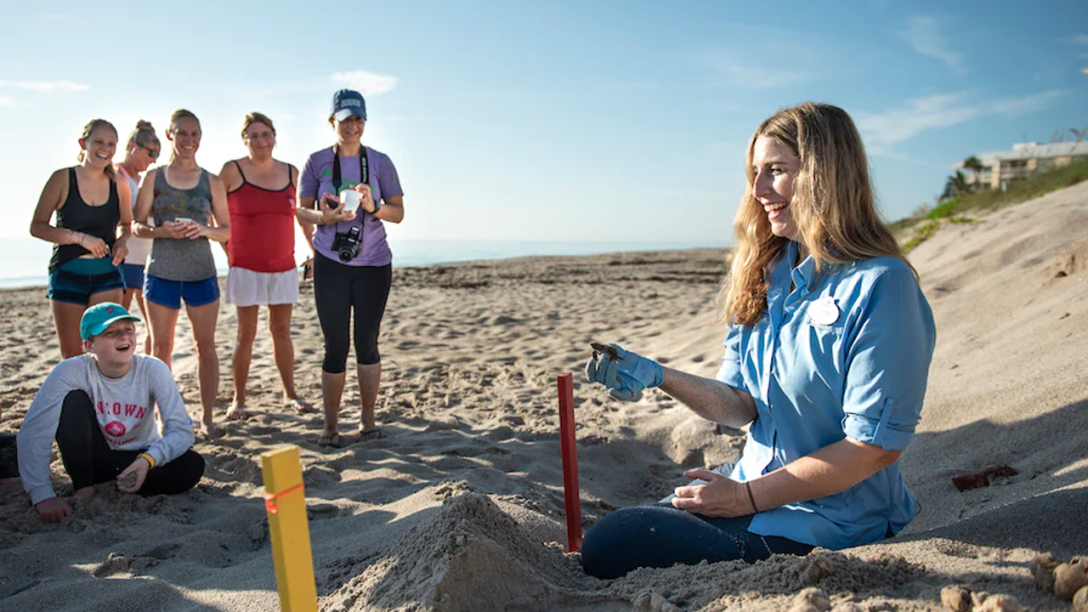Happy Earth Day! All week long, we’ve shared stories of how Disney is helping protect healthy lands and skies for wildlife and people. Today, we’ll be journeying to the coasts to learn how we are protecting life under the sea. From safeguarding key watersheds in Florida and California, to studying and protecting marine life and their habitats globally, we envision a future with healthy oceans and thriving coastal communities.
Join us as we dive into our beautiful, blue world.
For some marine species, like sea turtles, life begins on land and then migrates to the sea. For this reason, Disney Conservation Team Wildlife’s 19-year strong sea turtle field conservation program at Disney’s Vero Beach Resort prioritizes the protection and monitoring of sea turtle nests on the beaches surrounding the resort – one of the most important turtle-nesting habitats in the western hemisphere. The team recently recorded our millionth hatchling to successfully hatch and make its initial trek to the ocean.
The Disney Conservation Fund also supports long-term efforts to protect and restore sea turtle habitats, so that sea turtle hatchlings have the opportunity to grow up and lay their own eggs on Florida’s nesting beaches. Our collaboration with the Archie Carr Center for Sea Turtle Research at the University of Florida has resulted in 2.1 million pounds of debris removed from sea turtle habitats on beaches and at sea. Sea turtles are true sentinels of the ocean, and protecting them will help many other marine species.
Disney veterinarians and animal care specialists have rehabilitated and released more than 300 sick and injured sea turtles to date, and are even caring for some of these turtles at The Seas with Nemo & Friends at EPCOT as I penned this post.
In addition to sea turtles, the Disney Conservation Fund has supported field conservation programs for marine species in or near 50 countries around the world. In China, the China Blue Sustainability Institute has developed the first artificial intelligence community science reporting tool for the conservation of the imperiled Chinese white dolphin. Marine Megafauna Foundation’s Florida Manta Project has discovered a previously unknown population of manta rays on Florida’s east coast, and is collaborating with boaters and anglers to reduce vessel strikes and harmful fishing interactions with these gentle giants. And in the Cayman Islands,
Coral Restoration Foundation™ is working to restore coral reefs on an ecologically significant scale, using innovative science and technology to create a brighter future for these important ecosystems that support 25 percent of marine life in the sea.
Sharks and rays are also getting some much-needed conservation support through an incredible new initiative, Minorities in Shark Sciences (MISS). Carlee Jackson, a New College of Florida research associate working with Disney Conservation, co-founded MISS two years ago to create a more equitable pathway into marine science. MISS aims to ensure that everyone, no matter their background, can play a role in protecting our oceans. Further, they believe that diversity in scientists creates diversity in thought, leading to innovation within marine science.
The oceans inspire in us a sense of awe, wonder and sometimes fear. They cover 71% of the surface of our planet, but are the least explored. It’s clear that our actions have a significant impact on the world’s oceans, which is why we are so proud of our cast members and Disney VoluntEARS who dedicate their time and talent to protect our seas and the creatures who live there.
Together, we can work toward a future where our ocean, its inhabitants and communities around the globe who rely on it can exist in harmony and balance. And no matter where you live, you can be a steward for oceans and waterways! Here are a few ways you can take action:
- Choose sustainably sourced seafood when dining at a restaurant or shopping in your local grocery store. The Monterey Bay Aquarium’s Seafood Watch guide is an excellent resource to get started.
- Pick up litter in your local community – remember, all waterways lead to the ocean.
- Reduce your use of disposable (or single-use) plastics by choosing reusable alternatives like bags and bottles.
